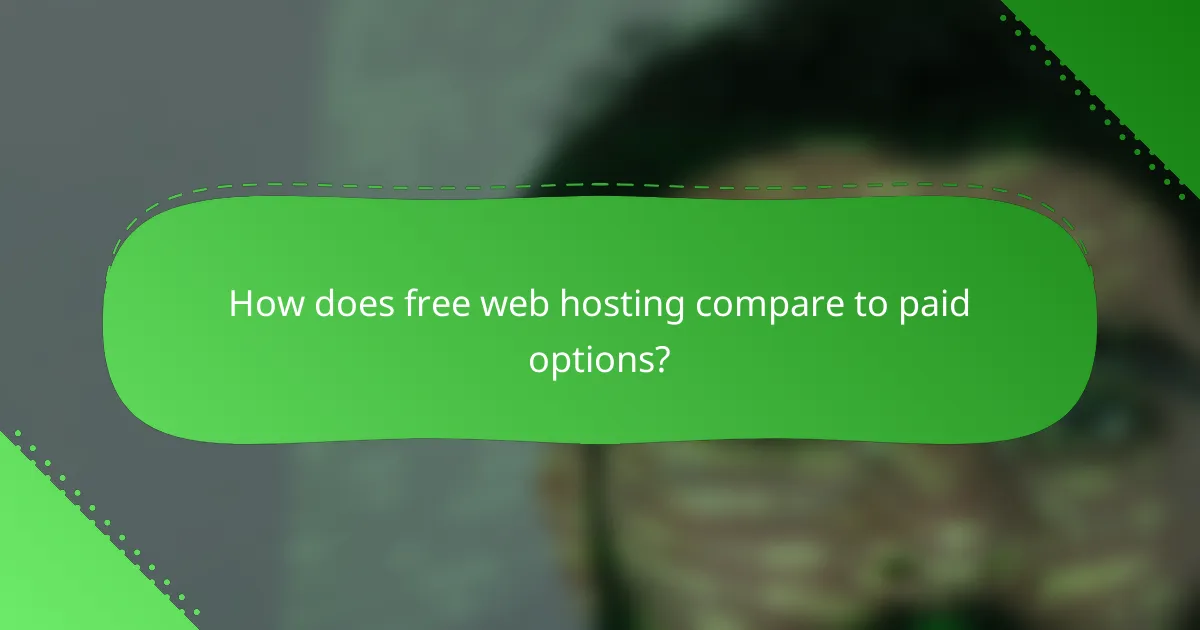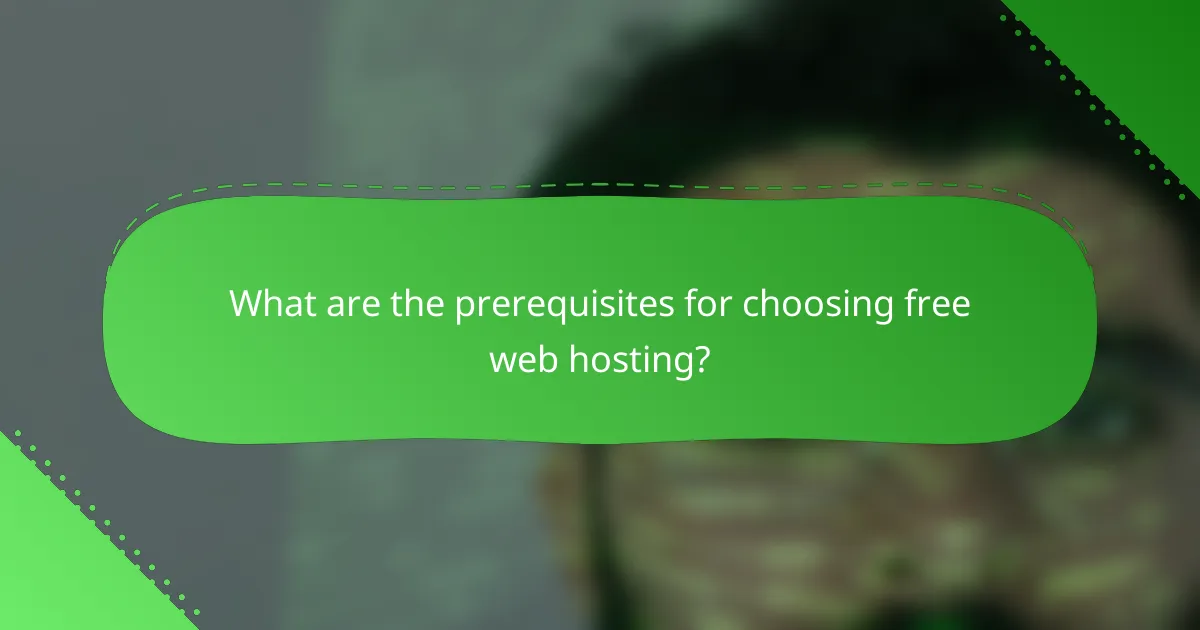Free web hosting services can be an excellent option for personal projects or small businesses, offering essential features like storage space and bandwidth. However, it’s crucial to be aware of their limitations, such as restricted resources, mandatory advertisements, and the lack of custom domain options. Understanding these factors will help you choose the right service for your needs while ensuring your website remains functional and reliable.

What are the best free web hosting services?
The best free web hosting services offer a range of features suitable for personal projects or small businesses. Key considerations include storage space, bandwidth limits, uptime reliability, and the presence of ads on your site.
InfinityFree
InfinityFree provides unlimited disk space and bandwidth, making it an attractive option for users looking to host multiple websites. It supports PHP and MySQL, allowing for dynamic content and database-driven applications.
However, users should be aware that while there are no forced ads, the service does have some limitations on file types and sizes. It’s ideal for personal projects but may not be suitable for high-traffic sites.
000webhost
000webhost offers a free plan that includes 300 MB of disk space and 3 GB of bandwidth per month. This service is user-friendly, with a website builder and one-click WordPress installation available.
While it has a solid uptime record, users may experience downtime during maintenance. It’s a good choice for beginners, but those needing more resources might need to upgrade to a paid plan.
Freehostia
Freehostia provides 250 MB of disk space and 6 GB of monthly bandwidth, along with a unique feature called Chocolate, which allows users to host multiple domains. It supports PHP and MySQL, making it versatile for various applications.
One downside is the limited storage, which may not suffice for larger websites. Users should consider their needs carefully before choosing this service.
ByetHost
ByetHost offers 1 GB of disk space and 50 GB of monthly bandwidth, along with a free control panel for easy management. It supports PHP, MySQL, and includes a website builder, making it accessible for newcomers.
However, the free plan has some restrictions, such as limited support and potential downtime. It’s suitable for small projects but may not be reliable for business-critical applications.
Wix
Wix is a popular website builder that offers a free hosting plan with a drag-and-drop interface. Users receive 500 MB of storage and 500 MB of bandwidth, which is sufficient for small personal sites.
While Wix is easy to use, the free plan includes Wix-branded ads and does not allow for a custom domain. It’s best for users who prioritize design and ease of use over advanced features.

What features should I look for in free web hosting?
When choosing free web hosting, prioritize features like storage capacity, bandwidth limits, uptime guarantees, and customer support options. These elements significantly impact your website’s performance and reliability.
Storage capacity
Storage capacity refers to the amount of data you can store on the hosting server. Most free web hosting services offer limited storage, typically ranging from a few hundred megabytes to a couple of gigabytes. Consider your website’s needs; if you plan to host images or videos, opt for a service with higher storage limits.
Check if the hosting provider allows you to upgrade your storage capacity later. Some platforms may offer paid plans that provide more space as your website grows.
Bandwidth limits
Bandwidth limits dictate how much data can be transferred to and from your website over a specific period. Free web hosting often comes with strict bandwidth restrictions, which can range from a few gigabytes to tens of gigabytes per month. Exceeding these limits may lead to additional charges or temporary suspension of your site.
Evaluate your expected traffic and data usage to choose a plan that accommodates your needs. If you anticipate high visitor numbers, look for options with higher bandwidth allowances.
Uptime guarantees
Uptime guarantees indicate the reliability of the hosting service, usually expressed as a percentage of time your website is online. Most reputable providers aim for at least 99% uptime, meaning your site could be down for a few hours a year. Free hosting services may not offer formal uptime guarantees, which can lead to unpredictable downtime.
Research user reviews and testimonials to gauge the reliability of a free hosting provider. A service with a history of frequent outages may not be suitable for your website.
Customer support options
Customer support options are crucial for resolving technical issues quickly. Free web hosting services often provide limited support, such as community forums or email assistance, rather than live chat or phone support. This can be a drawback if you encounter problems that require immediate attention.
Before committing to a free hosting provider, assess their support resources. Look for documentation, tutorials, and user communities that can help you troubleshoot issues independently.

What are the limitations of free web hosting?
Free web hosting services come with several limitations that can impact your website’s performance and professionalism. These restrictions often include limited storage space, restricted bandwidth, mandatory ads, and the inability to use a custom domain.
Limited storage space
Free web hosting typically offers minimal storage, often ranging from a few hundred megabytes to a couple of gigabytes. This limitation can restrict the amount of content you can upload, including images, videos, and other files.
For small personal projects or simple websites, this may suffice, but as your site grows, you might quickly outgrow the available space. It’s crucial to assess your storage needs before committing to a free service.
Restricted bandwidth
Bandwidth restrictions on free hosting plans can significantly affect your website’s accessibility. Many providers limit the amount of data transfer allowed per month, which can lead to slow loading times or even downtime if exceeded.
Typical bandwidth limits can range from a few gigabytes to tens of gigabytes per month. If your site attracts a decent amount of traffic, you may find yourself needing to upgrade to a paid plan sooner than anticipated.
Ads on your site
Most free web hosting services display ads on your website, which can detract from your site’s professionalism and user experience. These ads are often placed in prominent locations and can be difficult to remove without upgrading to a paid plan.
While some users may tolerate ads for the sake of free hosting, they can undermine your brand’s credibility and may drive visitors away. Consider the impact of ads on your site’s image before choosing a free option.
No custom domain
Free web hosting often does not allow the use of a custom domain name, forcing you to use a subdomain that includes the hosting provider’s name. This can make your website appear less professional and harder to remember.
For example, instead of having a domain like www.yourwebsite.com, you might end up with www.yourwebsite.freehost.com. If you plan to build a brand or establish a serious online presence, investing in a custom domain is advisable.

How does free web hosting compare to paid options?
Free web hosting typically offers basic services at no cost, while paid options provide enhanced features and support. Users must weigh the trade-offs in performance, reliability, and customer service when deciding between the two.
Cost-effectiveness
Free web hosting is appealing due to its zero-cost entry, making it ideal for personal projects or small websites. However, while it saves money upfront, hidden costs may arise from limited features or the need for upgrades later.
Paid hosting plans usually range from a few dollars to several hundred per month, depending on the services offered. Investing in a paid option often leads to better long-term value through improved performance and support.
Performance differences
Performance is a significant differentiator between free and paid hosting. Free services often experience slower load times and higher downtime due to shared resources among many users.
In contrast, paid hosting typically provides dedicated resources, resulting in faster website speeds and more reliable uptime. Users can expect load times in the low tens of milliseconds with paid options, compared to longer delays with free services.
Support quality
Support quality is generally lacking in free web hosting, with limited or no customer service available. Users may have to rely on community forums or self-help resources, which can delay problem resolution.
Paid hosting services usually offer 24/7 support through various channels, including live chat, phone, and email. This access to professional assistance can be crucial for businesses that require immediate help to maintain their online presence.
Feature availability
Free web hosting often comes with significant limitations in features, such as restricted storage space, bandwidth caps, and lack of custom domain options. These constraints can hinder website growth and functionality.
Paid hosting plans provide a broader range of features, including unlimited storage, enhanced security options, and advanced analytics tools. Users should assess their needs and choose a plan that aligns with their website goals to avoid future limitations.

What are the prerequisites for choosing free web hosting?
When selecting free web hosting, consider your website’s specific needs, your technical expertise, and any limitations of the hosting service. Understanding these factors will help you make an informed decision that aligns with your goals.
Understanding your website needs
Identifying your website needs is crucial before choosing a free hosting service. Consider the type of website you want to create, such as a blog, portfolio, or e-commerce site, as this will influence your hosting requirements.
Evaluate factors like expected traffic, storage space, and bandwidth. For instance, a simple blog may require minimal resources, while an e-commerce site with high traffic will need more robust capabilities. Make a list of essential features, such as domain support and SSL certificates, to guide your choice.
Evaluating technical skills
Your technical skills play a significant role in selecting the right free web hosting. If you have experience with website development, you may prefer a platform that allows for more customization and control. Conversely, beginners might benefit from user-friendly interfaces with drag-and-drop features.
Assess your comfort level with coding and troubleshooting. If you lack technical expertise, opt for hosting services that offer comprehensive support and tutorials. Avoid platforms that require advanced knowledge unless you’re willing to learn and experiment.
